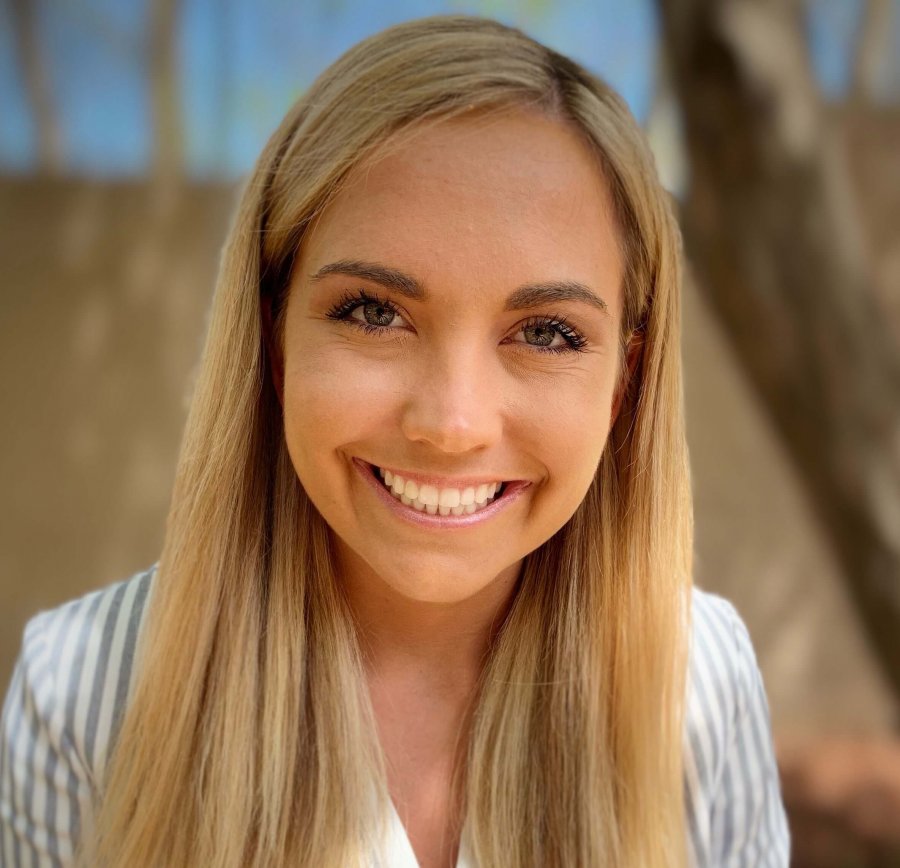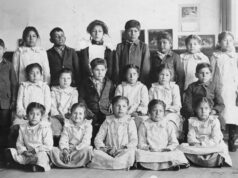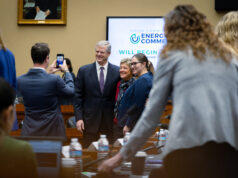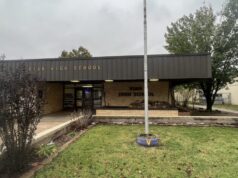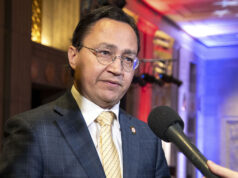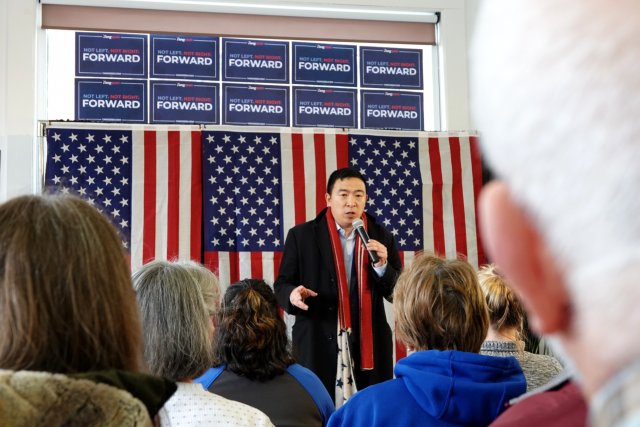
PERRY, Iowa — Forty miles outside the rush of Des Moines, Iowa, a rural farm-town of 7,500 people welcomed presidential candidates who were making last-minute campaign stops before the start of the 2020 Iowa caucus.
Perry is a central-Iowa town with a large Latino presence that has been regularly visited during the past month as Democratic candidates stump through the community in search of supporters. One of the candidates, Andrew Yang, was among those who visited the small town in recent days to meet with members of the community.
This story was reported by Gaylord News, a Washington reporting project of the Gaylord College of Journalism and Mass Communication at the University of Oklahoma.
Among the crowd, wearing a hat with Yang’s signature slogan “MATH” sewn into it, was an Oklahoma native who recently made the move to Iowa.
Troy Bradley said he accepted a job in Iowa, to be closer to his family. But Perry is not the same as the Iowa towns he remembered visiting as a child.
“The only people I ever saw in Iowa, looked just like me,” said Bradley, a tall, white man with light brown hair. “But it was like, I get up here to Perry, and there’s this whole other community.”
Along with Denison, Storm Lake and Marshalltown, Perry is one of only four towns in Iowa where the Latino community represents more than one-third of the population. In the very middle of the predominantly-white state, resident Daniel Rivera said the Latino residents of Perry are its backbone.
When Rivera’s family immigrated from Puerto Rico to Iowa nearly 22 years ago, they were the second Latino family to move to Perry. Soon after, a meat-packing plant opened in the town.
Since, the Latino population of Perry has expanded immensely. In 2017, the United States Census estimated that Hispanic and Latino residents represented more than 36 percent of the Perry, Iowa, population, but Rivera said the numbers are now in the mid-40s.
Processing similarities
Perry is comparable to Guymon, Oklahoma, which has a similar demographic. Like Perry, Guymon’s pork processing plant, Seaboard Foods ,employs 2,500 people, according to the company’s website
In 2017, more than 55 percent of residents in Guymon identified as Latino or Hispanic, according to Data USA. Additionally, more than 30 percent of Guymon’s residents were born outside of the U.S. Other similar Oklahoma towns include Watonga, with Latinos making up nearly 25 percent of the town’s population, and Hollis with more than 31 percent.
Rivera said although many immigrants came to Perry because of the jobs available in the meat-packing industry, members of these families are now doctors, lawyers and business owners throughout the town.
“They are not going to take us out,” Rivera said, as he began to laugh. “They would be in trouble because half of the town would be gone.”
‘Living our values’
On Dec. 9, a 14-year-old girl was hit by an SUV after the driver veered onto a sidewalk in Des Moines. The driver said she intentionally hit the girl, who was hospitalized for a week, because she was “a Mexican.”
During Yang’s town hall event, Perry newcomer Kelly Guinan began to tear up as she talked about the current immigration policies — and the cultural impacts of these policies — under President Donald Trump’s administration.
Guinan said she moved to Perry, instead of the nearby town her husband works in, because, as a blonde woman with blue eyes, she wanted to live with people who look different than she does — something that would not be likely in other small towns in Iowa.
“Our moving here was, I guess, a statement, but it was living our values,” Guinan said.
Every four years, voters and candidates talk about the changes necessary for immigration reform, but Rivera said nothing ever changes.
Because Rivera was born in Puerto Rico, he came to the U.S. as an American citizen. But after 2016, many of his friends questioned what could happen to them, as well as their children.
“Do you think if you are happy in your country, you have a good job and you have a way to live, you want to come to Iowa when it’s 20-below-zero and be cold and freezing? Who wants to do that? They come because there’s a reason,” Rivera said when asked about the national attitude surrounding immigrants.
‘A big, white state’
Although the Latino community thrives in Perry, the state of Iowa remains roughly 90 percent white, making it difficult for Latino voices to be heard during elections.
“If you’re here in town, yes, everybody is taking into consideration our ideas, our desires, our voices,” said Rivera. “But if you’re talking about the whole state, no. We are still a little portion of a big, white state, and it’s kind of hard to deal with that sometimes.”
But among the attendees of Yang’s town hall, less than a handful of Perry’s Latino residents were sitting in the crowd. When presidential candidate Sen. Bernie Sanders (D-VT) visited the town earlier the same week, the Latino community was, again, underrepresented.
While the Sanders event took place on a Sunday, Yang visited Perry on a Tuesday afternoon, a time when many voters were working. It is also possible that voters in the town attended previous rallies or favor candidates other than Yang and Sanders.
Rivera said there has not been a clear front-runner for the presidential primary election among the Perry community, and residents all have their own individual ideas about the election.
It is projected that in the 2020 general election, a record 32 million Latinos will be eligible to vote and will exceed the number of eligible black voters for the first time, according to a Pew Research study.
This does not mean that all who are eligible will vote in the 2020 election, but winning the approval of Latino voters could be vital to a presidential candidate’s success.
“We’re not here only to cut meat,” Rivera said. “We are more than picking up tomatoes, and that’s something that people should see.”











